
|
![]()
Greatest Films of the 1990s
1990 | 1991 | 1992 | 1993 | 1994 | 1995 | 1996 | 1997 | 1998 | 1999
Title Screen Film Genre(s), Title, Year, (Country), Length, Director, Description 


Amistad (1997), 155 minutes, D: Steven Spielberg
Spielberg's dramatic, lengthy epic about freedom and justice was the true story of America's slave trade, and the 1839 mutiny aboard the Spanish slave ship La Amistad traveling from Cuba to the US. The ship was loaded with valuable cargo - 53 kidnapped and chained slaves held by Spanish captors. The Africans had originally been captured in Sierra Leone (a British protectorate where slavery was outlawed), illegally brought by a Portuguese ship to Cuba, and then transferred to a Spanish ship for transport to the US. African Mende tribal leader Joseph Cinque (Djimon Hounsou) escaped from his chains, led a mutiny which killed all but two of the white Spanish captors, and directed the ship to sail back to Africa. Fooled by the navigators, they were captured off the NE US Long Island coast by the Navy, where the non-English speaking slaves were imprisoned, regarded as runaway slaves (and "property"), and charged with murder. During their initial trial in Connecticut, the slaves were defended in the test case by an African-American slave turned-abolitionist lawyer Theodore Joadson (Morgan Freeman), white colleague Lewis Tappan (Stellan Skarsgard) and naive attorney Roger Sherman Baldwin (Matthew McConaughey). The defense argued that the Africans (free in their own country) had been illegally seized to be sold in the US as "stolen goods," and acted in self-defense when they murdered their enslavers. Opposed was President Martin Van Buren (Nigel Hawthorne) who feared losing Southern votes during his re-election campaign if he supported the Africans' case. In fact, Van Buren's Secretary of State John Forsyth (David Paymer) argued that the slave "property" had to be returned to young Queen Isabella II (Anna Paquin) of Spain to honor a treaty between the two countries. However, the district court ruled in favor of the abolitionist and Africans' position. In early 1840, it ordered that the Africans be returned to their homeland by the US government. Eventually, the case was appealed to the US Supreme Court. The 1841 case before the US Supreme Court, composed of Southern slave-owning judges, was a stirring battle of wits. Former President John Quincy Adams (Anthony Hopkins), now a Massachusetts Congressman, provided a passionate defense of the African captives (he called Cinque "the only true hero in this room"). He eloquently and controversially asserted the right of freedom of the individual: "The natural state of mankind is... freedom. And the proof is the length to which a man, woman, or child will go to regain it, once taken. He will break loose his chains. He will decimate his enemies. He will try and try and try against all odds, against all prejudices, to get home." He referenced the well-known words of the Declaration of Independence: "'All men...created equal,' 'inalienable rights,' 'life,' 'liberty,'" and then dramatically tore a copy of it in half. He then invoked the wisdom and spirit of the Founding Fathers to help make the decision, and then suggested that the court's ruling might provoke a civil war ("the last battle of the American Revolution"). The higher court affirmed the lower court's ruling that the Africans were entitled to take whatever legal measures necessary to secure their freedom, including the use of force. They were authorized to return to their homeland.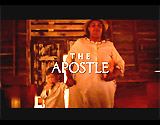
The Apostle (1997), 134 minutes, D: Robert Duvall



As Good As It Gets (1997), 130 minutes, D: James L. Brooks
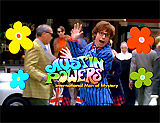

Austin Powers: International Man of Mystery (1997), 89 minutes, D: Jay Roach
See Austin Powers series.
This was the first installment of the PG-rated series of James Bond spy-movie spoofs - it was a fast-paced comedy filled with gags (both verbal and visual) and numerous catchphrases such as: "Bee-have," "Sake it to me baby!", "Yeah, baby, yeah," "Do I make you horny, baby?" and "Shall we shag now or shall we shag later?" In the year 1967, British spy Austin Powers' (Mike Myers) threatening arch-nemesis Dr. Evil (also Myers) (modeled after Blofeld in the James Bond films) gathered together six deadly assassins commissioned in his lair in Nevada to kill "Britain's top secret agent." The James Bondian agent - Austin Powers was introduced in London in the swingin' 60s, with his partner 1960s Emma Peel-like Mrs. Kensington (Mimi Rogers). He was able to prevent his own assassination attempt by Dr. Evil during a "swingin' shindig" in a London nightclub - the Electric Psychedelic Pussycat Swinger's Club. After mis-firing a dart into the back of his own assassin, Dr. Evil escaped onto the rooftop and entered a space-rocket (and its "Cryogenic Freezing" chamber), disguised as a giant Bob's Big Boy statue, and warned: "See you in the future, Mr. Powers." 30 years later in 1997, NORAD reported that Dr. Evil's Big Boy space rocket had entered the Earth's atmosphere over Nevada; in London, the Ministry of Defence decided to unfreeze Austin from his cryogenic state; [Note: in London in 1967, Powers had volunteered to have himself frozen "in case Dr. Evil should return," so that he could be defrosted to combat him.] The female narrator asked as the agent was brought back to life: "Who is this Austin Powers? The ultimate gentleman spy -- irresistible to women, deadly to his enemies, a legend in his own time." Powers was to be acclimated to the 1990s with the help of an associate "top agent" named Vanessa Kensington (Elizabeth Hurley), Mrs. Kensington's daughter. Dr. Evil had set up new headquarters in the desert outside Las Vegas. Evil's main associate was one-eye-patched businessman Number Two (Robert Wagner), who had been running Evil's multi-million dollar empire (known as Virtucon) - "the legitimate face of my evil empire." The objective of Dr. Evil's empire was to hijack nuclear weapons and hold the world hostage. Evil maintained a bizarre relationship with his resentful cloned son Scott Evil (Seth Green). He was told by his associate - militant Salvation Army founder Frau Farbissina (Mindy Sterling) - (a parody of Rosa Klebb in From Russia With Love), that his son was artificially-created in a laboratory (with Evil's frozen semen) during his 30 year absence. After first meeting his son, Scott refused a hug and called Evil a "lazy-eyed psycho." With the warhead, Evil suggested demanding an inflation-challenged ransom of $1 million dollars ("One... MEEE-llion dollars!"). Dr. Evil upwardly revised his ransom to $100 billion dollars!; Dr. Evil's main scheme was to blackmail the UN about his threat of nuclear weapons, but they refused as a general policy to negotiate with terrorists. Working together, Powers jetted off with Vanessa to Las Vegas, Nevada in his "groovy" psychedelically-painted private jumbo jet, while he continually attempted to seduce her. In Vegas, Vanessa and Powers shared a casino hotel room and posed as a married couple. They tracked Number Two to Las Vegas, and met him and his busty "Italian confidential secretary" Alotta Fagina (Fabiana Udenio) at a blackjack table. Powers was instructed to find out what part Evil's Virtucon played in "Project Vulcan" - by visiting Alotta Fagina's penthouse immediately. He learned that Project Vulcan was a scheme to drill deep underground and drive a nuclear warhead into the Earth's core, to trigger volcanic eruptions worldwide. The evil empire, due to a suggestion by Frau Farbissina, conspired to defeat Austin Powers with their "ultimate weapon" - a series of Fembots (introduced with Nancy Sinatra's singing of "These Boots Were Made For Walking"). They were beautiful blonde android replicants, wearing white boots and two piece outfits. They had protruding gunbarrels that emerged from their bikini-covered breasts. Vanessa (disguised as a cowgirl) and Austin (as a bearded guru) attempted to infiltrate the Virtucon headquarters during a guided tour. After leaving the group and steamrolling over a guard, they were apprehended by Dr. Evil's Korean ex-wrestler and evil henchman, Random Task (Joe Son). Inside Dr. Evil's underground lair, they watched as Dr. Evil presented his final ultimatum to the UN regarding his Vulcan subterranean drill that could deliver a 50-kiloton nuclear warhead into the liquid hot core of the planet. Left with no other choice, the UN decided to pay the ransom, although Dr. Evil still proceeded with his project. After Vanessa and Powers escaped, Austin came upon the Fembots who tried to seduce him by wearing purple fuzzy teddy-bear nightgowns. He was able to outwit and defeat the seductive android females by performing a sexy strip-tease "Dance of Death" (down to Union Jack red underwear and hairy chest) to the tune of "I Touch Myself," causing them to short-circuit with sexual electricity as their heads twitched violently and then exploded. Accompanied by British forces during a raid of Dr. Evil's headquarters, there was a stand-off between both sides when Number 2 unexpectedly tried to betray Dr. Evil by making a deal with Powers. A trap door activated by Dr. Evil eliminated Number 2. Evil then initiated a 30-second "SELF DESTRUCT" mechanism to blow up the complex, and again escaped in his cryogenic freezing chamber/Big Boy rocketship, while Vanessa and Austin also safely fled in their SWINGER sportscar parked outside. The film concluded with a classic honeymoon scene three months later - Austin Powers and Vanessa were in their hotel room's bedroom suite. Theye were told on a videophone by British Intelligence Agent Basil Exposition (Michael York) that Dr. Evil had escaped in his rocket - although he had disappeared from the tracking system. Suddenly, they were attacked by Random Task posing as room service, but subdued and knocked him out with a champagne bottle. On their balcony, the two viewed the night sky, where they spied one "big star" - Dr. Evil's spaceship.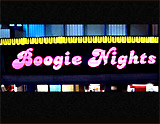


Boogie Nights (1997), 155 minutes, D: Paul Thomas Anderson
Paul Thomas Anderson's audacious film was about the late 1970s adult-film industry. Julianne Moore took a convincing role as Maggie, a cocaine-addicted, veteran porn star stage-named Amber Waves. Moore confidently personified her role as an X-rated film actress by taking off her clothes, mentoring young stud co-star Dirk Diggler (Mark Wahlberg), and having unsimulated sex with him during one of the film's explicit porn-shoots. She was thwarted from real motherhood during a custody battle with her estranged husband Tom, who took her to court. She was devastated when she was ruled an unfit mother for her addictive history of criminal activity, drug use, and her choice of career. She then turned around to become a vulnerable surrogate mother-figure to her 'family' of damaged and misfit souls during her workday: she considered Dirk her 'son,' and enjoyed being affectionately called "Mom" by grateful Rollergirl (Heather Graham).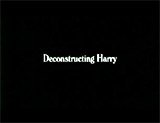


Deconstructing Harry (1997), 96 minutes, D: Woody Allen


Eve's Bayou (1997), 109 minutes, D: Kasi Lemmons
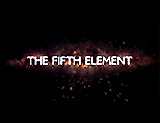


The Fifth Element (1997, Fr.), 125 minutes, D: Luc Besson



The Full Monty (1997, UK), 90 minutes, D: Peter Cattaneo
Director Peter Cattaneo's international buddy film - a British, working-class comedic drama with music and very quirky characters, was set in the 1990s in the northern British industrial steel city of Sheffield (South Yorkshire) where the steel industry and its steel mills were devastated - a far cry from 25 years earlier seen in a promotional film. In the rags-to-riches tale, a small group of desperate, bored and poor manual laborers who lost work six months earlier in closed steel plants reclaimed their lives by creatively using their bodies to acquire income. Its taglines were: "The year's most revealing comedy" and "Six men. With nothing to lose. Who dare to go....THE FULL MONTY." Divorced but determined Gary "Gaz" Schofield (Robert Carlyle) and his overweight best friend Dave Horsfall (Mark Addy) with low self-esteem and body-image issues both lost their jobs and were on government assistance (the dole). "Gaz" was faced with losing visitation rights with his estranged 12 year-old son Nathan (William Snape) if he couldn't afford child custody support payments. And Dave feared losing his wife Jean (Lesley Sharp) due to his sexual impotency and other strains on their marriage. Outside a local men's club known as the Millthorpe, "Gaz" found that the establishment had a long line (or queue) of women (for its "females only" night on May 4th) waiting outside, and paying an expensive cover charge for a one-time striptease show featuring a touring, exotic male stripper Chippendale-like group. Gaz set about to devise his own low-rent group of male strippers in a profitable, get-rich-quick scheme for his group of unemployed friends to make money, although he feared their less-than-perfect, flawed and average bodies would be a turn-off. Other recruits included depressed mill security guard Lomper (Steve Huison) who was rescued during a doomed-to-fail suicide attempt, and uptight, snobbish, middle-aged, amateur ballroom dancer Gerald Arthur Cooper (Tom Wilkinson) - their ex-foreman who was also financially stricken and keeping his own unemployment a secret for the previous six months from his credit card-obsessed spendthrift wife Linda (Deirdre Costello). A stripper audition was held to add more members; elderly black man Barrington "Horse" Mitchell (Paul Barber) with a "dodgy hip" was chosen due to being knowledgeable about earlier-era dance moves (the Bump, the Stomp, the Bus Stop, and the Funky Chicken) and his spirited dance moves. When uncoordinated candidate Guy (Hugo Speer) dropped his pants, Gaz observed: "Gentleman, the lunch box has landed," and Guy was immediately selected for his anatomical large endowment. During hilarious practice rehearsals, the clutzy would-be dancers worked on their bump and grind act; "Gaz" spread the news that their show for women only, dubbed "Hot Metal," would be unique by going "the full monty" (or complete nudity "with their widges hanging out" - "widges on parade"). In the film's famous short dole queue scene at the Job Centre, the unemployed working-class men from the Sheffield mill factory heard Donna Summer's Hot Stuff on the radio and rhythmically started moving, unable to resist the beat. As a result of an arrest for indecent exposure during a practice session for four of Horse's family members, the group learned that their show was sold-out and the entire group of six dancers was persuaded to perform for one-night only. In the uplighting finale, the stripper group restored their dignity and amusingly stripped on-stage during a rendition of Tom Jones' "You Can Leave Your Hat On." The film concluded as they went "the full monty" - they pulled off their red leather g-string thongs (with hat cover-up) to the delight of many screaming female fans - ending in a freeze-frame as they revealed all.

Good Will Hunting (1997), 126 minutes, D: Gus Van Sant
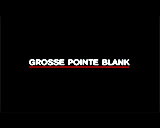


Grosse Pointe Blank (1997), 107 minutes, D: George Armitage


The Ice Storm (1997), 113 minutes, D: Ang Lee
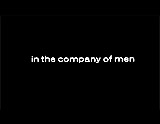


In the Company of Men (1997), 93 minutes, D: Neil LaBute




Kiss the Girls (1997), 115 minutes, D: Gary Fleder
This realistic murder thriller began when a college-age violinist (Gina Ravera) went missing in Durham, North Carolina. Her uncle, best-selling author and D.C. forensics expert Dr. Alex Cross (Morgan Freeman), joined local detectives and an FBI agent (Jay O. Sanders) at the scene, where eight girls were now missing and three bodies had been found. The demented serial killer, who called himself Casanova, was a collector who took captured "specimens" and imprisoned them in an underground lair, ritualistically raping and killing them if they violated his trust. A ninth kidnapped victim - strong-willed kickboxing medical intern Dr. Kate McTiernan (Ashley Judd) - was bound and drugged but escaped from Casanova (in a thrilling dash through the woods) and joined Cross in the search. A second killer, a competing psychopath known as The Gentleman Caller was discovered operating in the LA area. One red-herring suspect, Dr. Wick Sachs (William Converse-Roberts), confessed, but ultimately an unlikely pair of suspects were revealed as the evil collaborators.

Kundun (1997), 128 minutes, D: Martin Scorsese
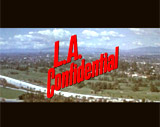



L. A. Confidential (1997), 136 minutes: D: Curtis Hanson
A gritty, violent, thrilling film noirish tale of sex, conspiracy, scandal, double-cross and betrayal, racism and corruption in early 1950's LA, committed by the police, politicians, and the press. The film pays homage to Robert Towne's earlier noir-based film Chinatown (1974) set in the same City of Angels, and the classics The Maltese Falcon (1941) and The Big Sleep (1946). Based on a thriller novel by James Ellroy, the film is about the intertwining lives of three very diverse LAPD officers (in an ensemble cast) who use incompatible methods while tackling a multiple murder scene at the all-night diner the Night Owl. Brutal, hot-tempered tough cop Bud Smith (Russell Crowe) uses muscle and violence, while moralistic, clean-cut, college-educated rookie Ed Exley (Guy Pearce) is law-abiding, idealistic, and does everything "by the book." A third narcotics cop, smooth Sgt. Jack Vincennes (Kevin Spacey) moonlights as a technical advisor for a sleazy Dragnet-style TV cop show and provides scandal-fodder for celebrity tabloid magazine Hush-Hush (headed by amoral editor-in-chief Sid Hudgens (Danny De Vito) whose trademark closing line for all articles is: "You heard it here first, off the record, on the 'QT', and very hush-hush"). All three are overseen by sinister Captain Dudley Smith (James Cromwell), who seems resigned to the corruption in the city and in his own police force. Kim Basinger, in a supporting Oscar-winning role, plays high-class femme fatale Lynn Bracken (a Veronica Lake look-alike through surgical enhancements) who works for a pornographer (David Strathairn) who hires out celebrity look-alike prostitutes.



Life is Beautiful (1997, It.) (aka La Vita E Bella), 122 minutes, D: Roberto Benigni


Lost Highway (1997), 135 minutes, D: David Lynch
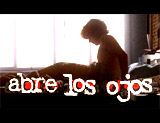



Open Your Eyes (1997, Sp./Fr./It.) (aka Abre Los Ojos), 117 minutes, D: Alejandro Amenabar



Princess Mononoke (1997, Jp.), 133 minutes, D: Hayao Miyazaki
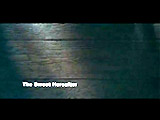

The Sweet Hereafter (1997, Canada), 112 minutes, D: Atom Egoyan
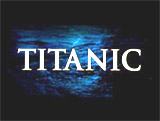


Titanic (1997), 197 minutes, D: James Cameron
Writer/director James Cameron's three-plus hour, epic mega-blockbuster with the most expensive budget of any film up to its time, and extravagant visual and digital effects. Its story centered around an infamous part of history (the fateful night of April 15, 1912 for White Star Line's R.M.S. Titanic) with a doomed, fictional romance at its core. It begins with treasure-seekers in a salvage expedition at the submerged ship led by Brock Lovett (Bill Paxton), who discover a safebox with a drawing of a woman wearing a 56-carat blue diamond necklace. They connect it to 102 year-old survivor Rose Dawson Calvert (Gloria Stuart) who revisits the site of the sinking, and reminisces, in flashback, about an ill-fated, forbidden romance she had when she was a seventeen year-old society girl. with lower-class, starving artist Jack Dawson (Leonardo DiCaprio). Earlier a debutante named Rose DeWitt Bukater (Kate Winslet), she had been forced by her mother Ruth (Frances Fisher) to become engaged to rich, arrogant socialite Cal Hockley (Billy Zane) and was on her way to Philadelphia to marry. Feeling hopelessly trapped, she tried to commit suicide from the aft deck rather than accept the arranged marriage, but was rescued by Jack. Although Jack was slighted by her upper-class family, she forsook her future with Cal and asked Jack to sketch her in the nude wearing the invaluable blue diamond, and they fell in love. When the ship hit the iceberg in the frigid North Atlantic and split in two, Jack sacrificed himself and again saved her from sure death. The characters of Rose and Jack and their romance wisely dominate the film, although there are some secondary subplots. Fans (mostly female) returned many dozens of times to enjoy the tale over and over and helped the film become the highest grossing motion picture of all time. Although praised by critics and the viewing public, there was some backlash about its acting (especially DiCaprio's) and its screenplay - Titanic became the first Best Picture winner to not have a Best Screenplay nomination since The Sound of Music (1965).